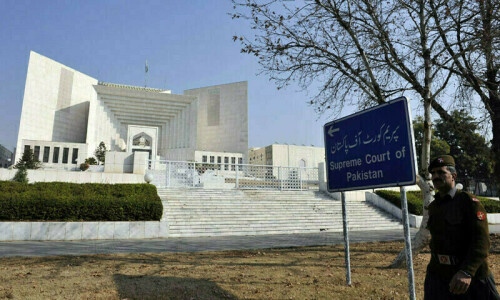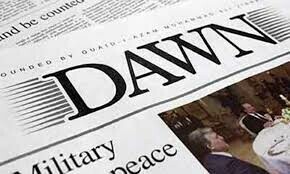Ever since Jinnah’s death in 1948, we have been gazing intensely at our navels to figure out what the founder of Pakistan said and/or didn’t say. Many of us have our own set of quotes of a man who passed away just one year after the creation of this country.
I have been going through Jinnah’s numerous speeches that he delivered from 1946 till his unfortunate death in 1948.
It seems Jinnah was everything to everyone — a progressive nationalist to the liberals; a faithful religionist to the religious right; a middle-of-the-road Muslim statesman to the moderates.
But the truth (to me) is that first and foremost he was a sharp politician. And like all good politicians, Jinnah was a pragmatist, adjusting his words according to his immediate surroundings.
For example, in multicultural Karachi he would insist that the state of Pakistan was to be progressive and democratic.
In Lahore, the scene of vicious Hindu-Muslim riots, and where many clerics had accused him of being a ‘fake Muslim leader’ in 1946, he would take a moderate view, suggesting that the South Asian Muslims had a rich cultural and political history that Pakistan ought to match.
In Peshawar, where Jinnah’s Muslim League had struggled to remain afloat in the face of the challenge posed by the left-leaning Pakhtun nationalists, Jinnah appealed to the sensibilities of the conservative tribes and clerics opposed to the nationalists.
While talking to the Western press he reminded the world that Pakistan was not to be a theological state, but a democratic Muslim-majority state where all citizens, no matter what their religion or ethnicity, would be given equal rights.
Ever since Pakistan’s inception more than six decades ago, its politicians, military dictators and intellectuals from all sides of the ideological divide have talked about working towards building ‘Jinnah’s Pakistan’.
The liberals and even many moderates have continued to present Jinnah as a progressive Muslim and an unbending democrat. The mainstream religious right and the conservative lot have been hailing him as a champion of ‘Muslim democracy’ and a modern interpreter of an Islamic state.
Left-leaning parties like the populist PPP, and the other such groups have been vowing to create a Pakistan based on the progressive vision of Jinnah.
Religious parties like the Jamaat-i-Islami (JI), on the other hand, want a Pakistan based on Jinnah’s desire and commitment of creating a country that would become a bastion and fortress of our faith.
Populist conservative parties such as PML-N, and Imran Khan’s Pakistan Tehreek-i-Insaf (PTI), interpret Jinnah’s vision as something to do with Pakistan being an ‘Islamic Welfare State’.
We only highlight things about our collective past that are according to what we like and imagine, while shunning, repressing and even decrying those bits that contradict our current stances.
Then there have been military dictators as well, all of whom claimed to be following the course laid down by Jinnah.
The secular Ayub Khan dictatorship (1958-69) understood Jinnah as a progressive Muslim statesman. The Ziaul Haq dictatorship (1977-88) claimed Jinnah to be a fearless Islamic figurehead. The Musharraf dictatorship (1999-2008) re-figured Jinnah’s image and made him to be a ‘moderate’ again.
But what exactly was Jinnah’s Pakistan? This question usually bags numerous differing answers. No party, military dictator, historian or intellectual trying to address this question has been able to come up with an answer that has enjoyed widespread acceptance. Jinnah died just too soon after the country’s creation for one to convincingly judge exactly what sort of a Pakistan he really wanted. Between Pakistan’s creation in August 1947 till his death one year later, Jinnah usually spoke according to the nature of his audience.
He was still in the process of testing the waters and formulating a cohesive idea about Pakistani nationhood when he died. That’s why all that emerged after his demise are just angled interpretations, claims and counter-claims by politicians, ideologues and historians about who Jinnah was and what he wanted.
There is nothing wrong in studying history and, especially, learning from it. But on most occasions than not, this is not really what we have been doing.
We only highlight things about our collective past that are according to what we like and imagine, while shunning, repressing and even decrying those bits that contradict our current stances.
That’s how Jinnah has been seen as well. Liberals will mark out the progressive views of Jinnah, whereas the conservatives will loudly quote from books that only mention quotes of Jinnah in which he comes across as a faithful conservative.
Today’s existentialist battles in Pakistan are being fought with what the founders of Pakistan said or didn’t say many years ago; A battle of existence that is threatening our future like never before. It is a battle lacking the desire to construct a vision or a discourse of what is to be done today and tomorrow.
Even while discussing possible future courses, we keep slipping backwards, quoting who said what in the past to supplement our view of Pakistan so it can dominate over the views of our ideological opponents.
We seem to be stuck in our own imagined views of history.
With so many Jinnahs floating around, the time has come to create a Jinnah of the future. By this I mean a well thought-out, debated and consensual vision of a Pakistan based on today’s realities.
Jinnah should be accepted as a pragmatist who today would have addressed issues like extremist violence and acts of bigotry not as an ideologue, but as a pragmatic statesman who would know that such issues were retarding the country’s economic, cultural and political evolution.
He would have understood that the rapid proliferation of conflicting ideas in Pakistan in the last three decades or so have made the bulk of the society increasingly reactive.
The pragmatic Jinnah would not sit on the fence like most of today’s ‘moderates’, and call it a middle-ground.
He would assertively create a real middle-ground between religious conservatism and liberalism, for which he would not hesitate to alter, modify and reform a number of things.
Jinnah would not do this out of any ideological compulsion. He would do so for the survival of Pakistan — a country torn and plagued by religious and ethnic strife that is bringing its economics and society to a standstill.
The pragmatic Jinnah would try to find unity in diversity and draw from each ethnic culture, as well as from Muslim sects and sub-sects and minority religious groups in the country, choosing the best that they have to offer to Pakistan in developing its economy, its arts, its sports and its reputation as a modern, thriving and vibrant Muslim nation-state. It’s about time we stop studying and propagating Jinnah as an ideologue. He was an astute and enlightened pragmatist, and pragmatism demands we begin to see him in this light and do today what any enlightened and astute pragmatist would do for the country that he so painstakingly created. n
Published in Dawn, Sunday Magazine, May 25th, 2014














































